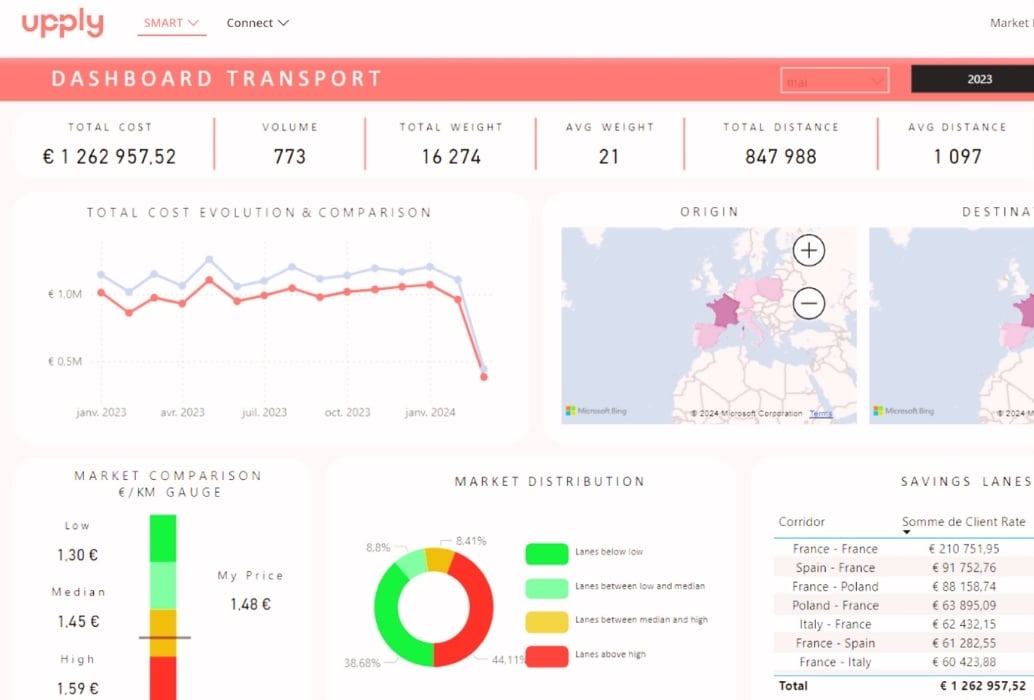Transport tenders: Define your objectives
before getting started
Transport tenders are an essential opportunity for companies to control their logistics costs, improve the quality of their services, and boost their competitiveness.
The first step to a successful transport tender is a solid strategic framework and a clear definition of objectives.
A well-executed call for tenders enables us to select the best service providers in terms of cost, quality of service and reliability. This practice also promotes transparency and fairness, by ensuring that all proposals are evaluated on the same set of criteria.
The Challenges of the launch phase
Identify your company's strategic objectives: check your price positioning, change service providers, expand your network, support international expansion, etc.
Consider the current dynamics of freight transport: understand trends and developments to better position yourself in a competitive market.
Identification of company objectives
- Financial objectives: Set clear objectives in terms of cost reduction and return on investment. This can include specific targets for reducing transport costs, optimizing routes, and consolidating shipments.
- Operational objectives: Define operational objectives such as improving delivery times, reducing delays, and increasing supplier reliability, for example. These objectives must be measurable and aligned with business needs.
- Environmental objectives: Integrate sustainability objectives, such as reducing CO2 emissions and adopting environmentally friendly transport practices.
Freight transport: a constantly evolving market
Price trends in the freight market depend on several factors:
- Balancing supply and demand: demand for transport is influenced primarily by the overall economic situation, but also by seasonal factors in certain sectors. At the same time, transport supply is also subject to change. The balance between transport demand and available capacity plays a decisive role in the evolution of transport prices.
- Costs: transport service providers are faced with fluctuating costs. In road haulage, personnel costs and fuel costs are the two most important items, but other factors also come into play, such as tolls and maintenance costs.
- Regulations: the freight transport industry must constantly adapt to changes in the regulatory framework, and to targets for reducing CO2 emissions. Companies are increasingly being assessed on their sustainability initiatives. The need to reduce their greenhouse gas emissions influences their choice of service providers. Other regulations, such as the Mobility Package, also influence operating costs.
- Technological innovation: from optimizing supply chains to developing new propulsion systems for trucks and ships, the freight transport sector is currently undergoing profound transformations. The use of tools based on artificial intelligence and the management of large volumes of data is helping the sector to become more efficient.
How Upply Helps You Define Your Transport Objectives
Market analyses to understand and anticipate trends
To shed light on the evolution of transport prices and understand future trends, Upply offers its Market Insights: articles and white papers written by our industry experts, who decipher for you the major challenges facing freight transport: economic environment, regulations, decarbonization, digitalization.
Our useful resources for preparing your tender:
- European Road Freight Rate Development Benchmark Report: the quarterly "European Road Freight Rate Development Benchmark" report, produced by Upply in partnership with Ti Insights and the IRU, is an essential resource for understanding the dynamics of the European road haulage market. This report provides an analysis of road freight rates, the latest economic trends, and factors influencing transport costs, such as fuel prices, driver shortages, or geopolitical elements.
- Barometers: in addition to the quarterly report on the European transport market, Upply offers a monthly barometer of freight transport in France. This report provides an analysis of transport price trends in this market, and of the dynamics influencing freight rates.
Indexes (UFI) to monitor and anticipate price trends in advance of your call for tenders
UFI (Upply Freight Index) enables you to track macro trends and price trends (including diesel) on your main corridors over the last 3, 6, 12 or 24 months.
Based on 750M invoiced price data from +4,000 partners and customers (shippers, carriers, forwarders), the average price in €/km is calculated monthly, but the underlying data is updated daily. UFI is based on the Spot and Contract markets, with historical data dating back to January 2019. UFI is the most reliable and representative reference index for transport prices on the French market.
- Track price dispersion on major corridors and compare up to 3 corridors simultaneously
- View future trend estimates for up to 6 weeks ahead, to anticipate market volatility, opportunities and reversals.
- Support your transport purchasing decisions and strategy with 59 European and 17 global price indices
Discover all key steps for successful transport tenders

Step 2
Optimise your logistics operations by auditing your current carriers and finding new service providers for your transport tenders.
Read the article
Step 3
Dive into analysis techniques with our comparative tools and interactive dashboards to choose the best partners.
Read the article
Step 4
Control the monitoring and evaluation of your post-contract operations with our monitoring solutions and detailed reports.
Read the articleLearn more about Upply
